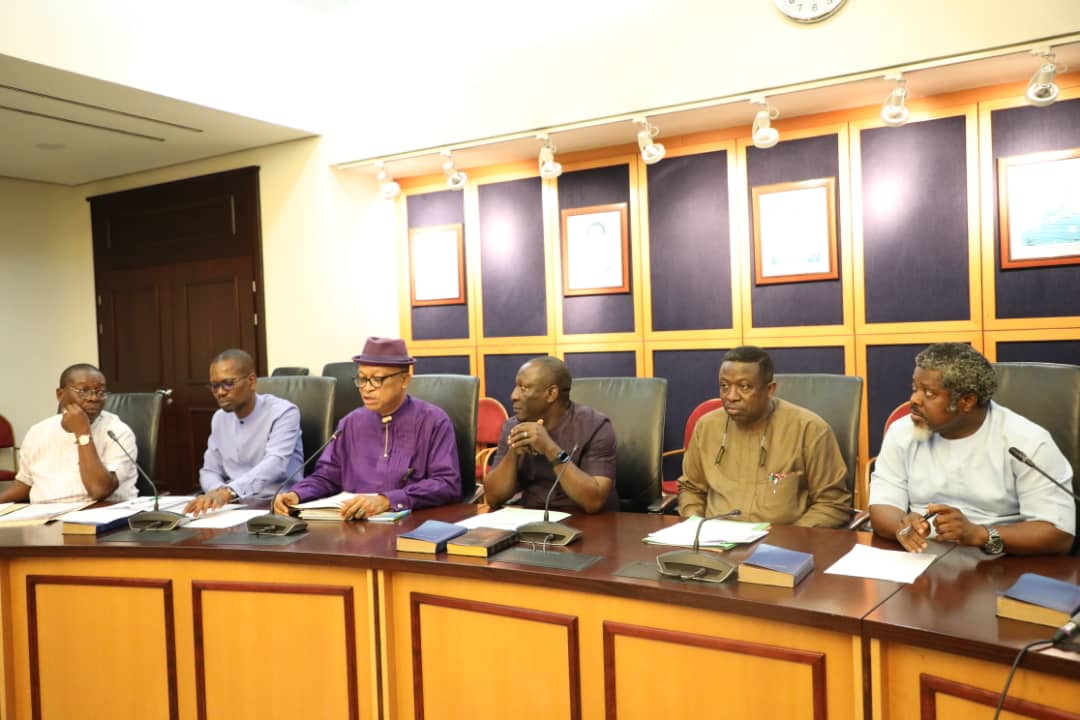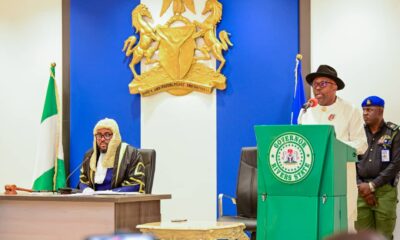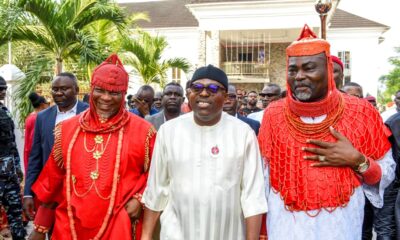Editorial
2023: Need For Sustained Governance

The Rivers State Governor, Chief Nyesom Wike’s admonition to the newly sworn-in Commissioners in the state to recommit themselves to the tasks assigned to them to achieve desired results is apt. The governor spoke while addressing 18 new commissioners during their swearing-in ceremony at the Executive Council Chambers of Government House, Port Harcourt, Wednesday, last week.
Governor Wike observed that because some members of the State Executive Council did not appreciate the enormity of the task given to them, they took to sycophancy while abandoning their duties. “This is the last lap of our administration. We have only seven months to end the tenure of this administration. It is very important for you to understand that you have to double your efforts to make sure that what we have started will be completed.”
This is a timely call as already, many public officeholders at the federal, state, and local government levels have altogether abandoned governance or service delivery and plunged headlong into politicking ahead of the 2023 election cycle. The governor’s clarion call to his new commissioners should trickle down to all strata of government, particularly the federal, while other state governors should follow suit in their respective jurisdictions.
The charge raises several questions concerning governance in the country, especially viewing the many unfinished and abandoned plans and projects. With the onset of the party primaries and later political campaigns, it became apparent that the pace of activities in some ministries, departments, and agencies had slowed, and political officeholders should focus on their immediate responsibilities.
At a time when public confidence in governance in the nation is waning because of the government’s inability to meet its commitments and other reasonable expectations, continued attention is required to the execution of policies and programmes to achieve service delivery goals. Governor Wike specifically emphasised the need for a proper handover to the succeeding administration to be done early and charged the new and old members of his cabinet to ensure the quick conclusion of their reports.
It is unsurprising that despite intense electioneering towards next year’s general election, governance in Rivers has not waned as the governor has been executing and commissioning projects in the state. This is a rare feat that has enhanced the governor’s profile. For this reason, he has continued to receive accolades for his unprecedented achievements in the delivery of impactful projects with candour in the face of glaring challenges.
Rather than quit governance in the short time left, political officeholders including President Muhammadu Buhari can redeem part of their battered image by correcting their misgoverning and the wrongs they have committed against Nigerians and possibly completing several projects as their heritages. This should be devoid of chicanery or false declarations of completion.
Curiously enough, Buhari also recognised the imperatives of sustainable governance regardless of the ongoing campaigns for the 2023 general election. He charged his ministers, permanent secretaries, and heads of government agencies to refrain from abandoning their primary assignments for political campaigns ahead of the 2023 general elections. He accentuated that despite the campaigns, the business of governance must continue to receive the necessary engagement.
But the President should see through his many promises in 2015 and 2019 to improve the fortunes of Nigerians. For example, the administration virtually abandoned the privatisation it promised in its over seven years in office. It can initiate the process before leaving the office. Buhari’s pledge to improve power supply through the Power Transmission Rehabilitation and Expansion Programme, and to raise power generation to 25,000 megawatts in partnership with Germany’s Siemens AG has remained unfulfilled.
The Federal Government’s report card on the four refineries in Port Harcourt, Warri and Kaduna is scandalous. Since taking office in 2015, it has wasted N1.3 trillion on moribund refineries. But being in oblivion, the country spends billions of dollars importing refined products and trillions of naira to subsidise the price of imported petrol. The Nigeria Extractive Industries Transparency Initiative (NEITI) said Buhari has so far spent 6.88 trillion naira on subsidies and is on the way to raising it to 10.97 trillion naira.
Many governors are guilty of practically abandoning their official duties to pursue re-election or Senate seats. They must ensure that the business of government continues to receive the needed attention, notwithstanding that the nation has entered the peak period of electioneering campaigns. Guaranteeing that government business remains on course is crucial at this point because of the implication a properly arranged performance has for the transition to another administration.
Governance suffers when governors and other political office holders in the country abdicate their responsibilities for transition politics. It is irresponsible that some states at the centre of insecurity still find time to shine on the national stage while their people are murdered in droves. Those who play the role of political “kingmakers” participate in endless meetings and negotiations outside their bases.
From 1999 to the present, democratic practice in Nigeria has barely lived up to its commitments, whether in terms of representation, popular participation, people-centred planning, distribution and use of resources, security of life and property, or the preservation of fundamental freedoms and liberties. Politicians despise the people and their concerns. This mindset should change. The people themselves should hold public officials accountable through legitimate civic activism and pressure groups.
Editorial
A New Dawn For Rivers’ Workers

Workers in the Rivers State civil service have been eulogising Governor Siminalayi Fubara for delivering on his promise to implement a new minimum wage of N85,000, which was reflected in the salaries paid for November. This increase is N15,000 higher than the national minimum wage of N70,000. This represents not only an enhancement in the financial welfare of civil servants but also a recognition of their hard work and dedication to public service. The raise has been met with widespread jubilation among the workforce, who have long advocated for a better wage to cope with rising living costs and economic challenges.
As the news spread, offices filled with laughter and sigh of relief, as employees exchanged stories of how this financial boost would positively impact their families and dependants. The new minimum wage is not just a number; it symbolises the government’s commitment to improving the standards of living for civil servants and fostering a more equitable workforce. Many workers expressed their gratitude for the governor’s timely intervention, highlighting how important it is for public servants to feel valued and adequately renumerated.
Governor Fubara’s decision is expected to reinforce morale within the civil service, fostering greater productivity and dedication among employees who contribute significantly to the state’s development. With the new wage in place, there is a renewed sense of optimism among civil servants, who now feel more empowered to serve the government and the citizens with greater enthusiasm and commitment.
The Governor had declared an increase in salaries for state workers, emphasising that this adjustment is not only a reflection of the government’s commitment to improving the welfare of its employees but also a strategic move fueled by the state’s enhanced Internally Generated Revenue (IGR). He assured workers that the financial backing for this increment is sustainable, stemming from the state’s focused efforts to bolster revenue through various initiatives, including tax reforms and enhanced efficiency in public service delivery.
Furthermore, the governor’s promise of funding the increment solely through increased IGR signifies a commitment to fiscal responsibility and transparency. It reassures the people that the government is proactively managing resources while investing in their future. As the state continues to explore opportunities for revenue enhancement, Fubara’s administration remains focused on ensuring that these initiatives translate into tangible benefits for the workforce, ultimately fostering a more motivated and dedicated public sector.
The decision by Fubara to be the first in Nigeria to implement the new national minimum wage is a commendable step that reflects a proactive approach to governance and an understanding of the pressing needs of the workforce. In an economy where many families struggle to make ends meet, especially in the face of rising living costs, this enterprise will improve the quality of life for workers and also set a precedent for other states to follow.
In recognising the various drives and support provided by Fubara’s government, it is necessary that the workers reciprocate by embodying a spirit of productivity and commitment to the current administration’s goals. They should align their daily operations with the administration’s objectives to enhance effectiveness and foster an environment of collaboration and trust. This reciprocal relationship can lead to innovative solutions and efficient service delivery, ultimately benefiting the state and strengthening public trust in government institutions.
Surprisingly, despite the political challenges the government has been navigating, alongside the myriad of ambitious projects it is embarking on, it has managed to raise funds to implement a minimum wage of N85,000 This achievement reflects a commendable level of resilience and resourcefulness within the government’s fiscal strategies. In a nation often marred by economic volatility and political discord, finding a way to sustain and even elevate the livelihoods of its employees is no small feat.
Workers in the state have truly found themselves in a remarkably advantageous position under this administration, especially when compared to the previous regime. The immediate past government’s blatant refusal to implement the minimum wage of N30,000 left many employees disheartened and struggling to meet their basic needs. What was even more disconcerting was the absence of meaningful negotiations with labour representatives, leaving workers feeling unheard and undervalued. In contrast, the present administration has prioritised dialogue and engagement with labour unions, recognising the importance of fair wage for workers’ contributions to the state’s economy.
With the current government’s commitment to improving wages and working conditions, it is clear that a major shift has taken place. This renewed focus on the welfare of workers empowers them and instils a sense of hope and optimism for the future, as they can now look forward to a more equitable and supportive work environment. Ultimately, the ongoing trajectory suggests a promising era for labour relations in the state, one where workers are valued and their rights upheld.
Siminalayi Fubara has consistently demonstrated his dedication to workers’ welfare since taking office in May last year. Unlike his predecessor, who left many employees feeling overlooked and unsupported, Fubara wasted no time in addressing the longstanding stagnation of promotions that had plagued the workforce for eight years. He took further steps towards financial justice by initiating the long-overdue payment of gratuities that were neglected during the last administration.
Similarly, we urge the governor to take another step forward by reviewing the stipends received by pensioners. The current pension amounts have become woefully inadequate, leaving many of them who dedicated their lives to public service struggling to make ends meet. These dedicated individuals who have contributed to the development of our dear state now find themselves in a precarious financial situation, receiving stipends that are alarmingly low and insufficient to cover basic living expenses. The rising cost of living has rendered their pensions nearly meaningless. Therefore, a comprehensive reevaluation of these stipends is a required measure to ensure that those who have served our state with honour can live their remaining years with dignity and security.
Editorial
Another Look At Contributory Pension Scheme

In a report from the National Pension Commission (PenCom), it was disclosed that only 26 states in Ni-
geria have implemented the Contributory Pension Scheme (CPS), two decades after the Pension Reform Act (PRA) 2004 was passed. The report highlights the inconsistent espousal of the CPS across states, with some states partially adopting the scheme, others not yet participating, and some facing challenges in getting the bill approved in their state legislative assemblies.
In 2012, the Rivers State Government, under the leadership of former Governor Chibuike Rotimi Amaechi, embarked on a critical initiative by enforcing the Contributory Pension Scheme. This strategic move aimed to establish a sustainable pension system by requiring contributions from both the employer and the employee. The arrangement was designed to ensure that employees have a secured and reliable source of income post-retirement, fostering financial security and stability for the workforce.
Following the introduction of the plan, the government adopted a three-year transition that aimed to fully implement the scheme by 2015. During this transition period, the authorities focused on educating both employers and employees about the benefits and responsibilities of the CPS. This included workshops, seminars, and public awareness campaigns to ensure that all stakeholders were well-informed about the scheme.
The creation of the CPS represents an important milestone in the ongoing efforts to overhaul and enhance the state’s pension system, aiming to establish a more robust and secure retirement savings framework for its workforce. The primary objectives of the CPS are to effectively tackle the inherent shortcomings of the former pension system, including limited coverage, insufficient benefits, and financial uncertainty. This strategic framework is designed to ensure that employees receive sustainable and dependable retirement benefits.
However, to ensure fairness and protect the rights of all workers, it is imperative that the effective date of the contributory pension law be prospective, applying only to workers hired in or after 2012. This would allow those employed before 2012 to continue to benefit from the provisions of theDefined Benefit Scheme (DBS), while ensuring that new hirees are subject to the updated pension provisions.
Unfortunately, the pension programme has experienced several challenges. Despite monthly deductions being taken from civil servants’ salaries for their counterpart funding, the government has not fulfilled its obligation to contribute its share. This has impeded the advancement of the scheme and has left many civil servants without sufficient pension arrangements upon retirement.
As a result, the state pension law has undergone multiple revisions to address the issue of retiring civil servants who ordinarily should be covered by the contributory scheme. The amendments have aimed to accommodate these individuals within the DBS which provides a guaranteed level of pension, based on years of service and salary grade level.
The inability of the contributory pension scheme to gain traction has sparked worries about the long-term viability of the state pension system. The absence of government contributions has resulted in a funding shortfall that jeopardises the government’s capacity to fulfil its pension commitments to employees in the future.
Even if the CPS was created to address the perceived shortcomings and lack of sufficient funding of the DBS by combining funds from employers and employees’ contributions to pension funds custodians, retirees under the scheme have not experienced better outcomes than those who retired under the DBS. On the contrary, the execution of the CPS is different from what its advocates led employees to expect.
The complaints regarding the implementation of the CPS are varied and concerning. Retirees are underpaid despite years of dedicated service, with some having served for the mandatory 35 years. Corruption is rampant within the system, and many state governments and employers are not complying with the provisions of the Reform Act, 2014. Labour leaders in the country have criticised the scheme as being anti-workers and retirees welfare. The Association of Senior Civil Servants of Nigeria (ASCSN) has even called for the scheme to be scrapped, labelling it as a “huge fraud.”
Similarly, we urge the Rivers State Governor, Siminalayi Fubara, to completely abolish the contributory pension scheme in the state, as it will not benefit civil servants. We are particularly concerned about the future of workers who will retire under this scheme, especially since the current legislation allowing for the Defined Benefit Scheme will be obsolete in June next year, when the contributory pension law will be effective.
Moreover, the state government is deducting and remitting workers’ contributions to the pension scheme, but failing to contribute their own counterpart funds as required by law. This action is a violation of the rights of contributors as outlined in section 4(1) of the Pension Reform Act 2014. According to this section, employers are mandated to contribute a minimum of 10 per cent of an employee’s monthly salary to their pension fund administrators. Employers are also required to deduct a minimum of eight per cent from the employee’s salary and remit it to the fund administrator.
A government that supports labour rights, like the current one, should not allow workers to suffer from a failed retirement scheme. Workers who are close to retirement age should not have to face unnecessary challenges. The failure of the scheme is evident from the number of agencies that have withdrawn from it. Therefore, it is important for the state leadership to revoke the legislation.
Unlike previous administrations that may have disregarded the experiences of workers in the state, the present government has consistently recognised and appreciated their contributions. The labour-friendly policies of this government have shown its dedication to the well-being of workers. However, the failed retirement scheme remains a critical issue that needs to be addressed.
Editorial
Making Rivers Investment Destination

Determined to make a difference in governance, Rivers State Governor, Sir Siminalayi Fubara, has signed an Executive Order aimed at the establishment of an investment agency. This initiative is poised to coordinate the growing number of enquiries and business interests expressed by local and foreign investors who now consider the state a destination of first choice. The Governor has endorsed Executive Order No. 002 of 2024, establishing the Rivers State Investment Promotion Agency (RIPA), presented by the Attorney General and Commissioner for Justice, Dagogo Israel Iboroma, SAN.
The Governor explained that what he had just done was to give force to one of the recommendations in the report submitted to him by the committee that handled the organisation of the Rivers State Economic and Investment Summit in May. He said it was undisputed that the summit served as a veritable platform to open up the state for economic advancement, adding that the Investment Promotion Agency would be a one-stop shop to handle all related activities seamlessly in the state.
Fubara said: “This will enable investors, when they come in; they won’t need to run around, and maybe, fall into wrong hands or associations that will want to rip them off their investment stakes. With this, they will have an agency that they could go to, liaise with and the agency will have the required answers to whatever it is that they will need to address concerns before it.”
It is common knowledge that Rivers State is rich in natural resources and has a thriving economy primarily driven by oil and gas. However, beyond these industries, there is an abundance of other untapped opportunities in agriculture, tourism, and technology. Yet, despite its wealth of resources, the state has faced numerous challenges such as infrastructural deficits, poor governance in the past, and an economy heavily reliant on oil. As a result, diversifying the economy has become obligatory.
This development is a significant step towards making Rivers State a premier investment destination, with the Agency expected to play a critical role in attracting and retaining businesses, creating jobs, and driving economic growth. Fubara’s action points to the fact that beyond organising the summit, his administration can live up to fulfilling its promise of making Rivers State great again, economically. Any wonder the Governor stated he was not going to end with the signing of the Executive Order alone but would drive it to a conclusive end to achieve the desired fulfilment that Rivers people expected.
The recent inauguration of RIPA’s board marks a watershed moment in the state’s economic trajectory. Fubara’s decision to set up the Agency reflects his administration’s commitment to reversing the economic decline that has plagued the state for years. By appointing a new board, the government aims to inject fresh ideas and perspectives into the establishment, promoting a culture of transparency, efficiency, and accountability.
Entrepreneurial drive is strong in our state, leading to the daily rise of small-scale enterprises and new entrepreneurs. In today’s world, aspiring business owners frequently face challenges like insufficient funding, limited access to information about available resources, bureaucratic obstacles, and a lack of supportive government policies. The current administration should acknowledge these challenges and be dedicated to stimulating a favourable investment climate.
While the Governor’s vision and the Agency’s efforts are critical, achieving sustainable economic transformation will require collective engagement from all stakeholders. The active participation of the community, local businesses, and civil society is essential for the realisation of these goals. Community involvement is pivotal in ensuring that the needs and aspirations of the populace are integrated into the economic policies and initiatives. Creating avenues for public participation not only empowers citizens but also nurtures a shared sense of responsibility towards the development of the state.
The role of the media cannot be understated in this collective effort. The media serves as a watchdog and an informer, ensuring that the government remains accountable and that citizens are aware of opportunities and challenges in the economic landscape. As with any ambitious vision, several challenges may impede the speed to economic transformation in the state. These challenges must be acknowledged and addressed to ensure that progress is sustainable. The government, alongside the Agency, must proactively identify the barriers and develop strategic solutions.
Corruption remains a vital hurdle in many sectors in Nigeria, and Rivers State is no exception. To combat this, the government must demonstrate unwavering commitment to transparency and accountability, ensuring that funds allocated for development are utilised effectively. Also, the state must prioritise infrastructure development, which is foundational to economic growth. By investing in modern infrastructure, the government can lay the groundwork for enhanced productivity and attract local and foreign investors, nourishing an environment conducive to economic development.
Fostering partnerships with international organisations and development agencies can provide valuable resources and expertise. Such partnerships can facilitate technology transfer, capacity building, and investment opportunities that enrich the local economy. Furthermore, the message of economic transformation must be communicated to all residents of the state. Building awareness and consensus around the vision for the state will galvanise support and encourage collective participation in the transformation endeavour.
Undeniably, Fubara’s leadership and vision have given Rivers people hope for a better economic future and his initiative has put the state on the path to realising its full potential. Its commitment to creating an investment-friendly environment is necessary to attract investors and stimulate economic growth. RIPA’s mandate to return Rivers State to its rightful place as an economically viable entity is a challenge that requires collective effort and support.
-

 News1 day ago
News1 day agoFUBARA MOURNS FORMER RIVERS GOV
-

 Transport2 days ago
Transport2 days ago‘Poor State Of Road Affecting Onne Port’s Operations’
-

 News1 day ago
News1 day agoMayor Of Housing Wins Man Of The Year Award
-

 News1 day ago
News1 day agoArmy Destroys 20 Illegal Refineries, Arrests Eight In N’Delta
-

 City Crime1 day ago
City Crime1 day agoFUBARA PRESENTS N1.188TRN AS 2025 BUDGET TO RSHA
-

 News1 day ago
News1 day agoWE’LL IMPACT LIVES OF RIVERS PEOPLE EQUALLY, FUBARA ASSURES
-

 News1 day ago
News1 day agoWE NEED TO WORK TOGETHER IN S’SOUTH TO ACHIEVE REGIONAL DEV, FUBARA INSISTS
-

 News1 day ago
News1 day agoTinubu Rejoices As Warri Refinery Begins Operations

